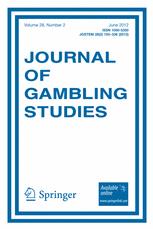Abstract:
Our objectives for this report were to identify trajectories of youth gambling behavior, and to examine their relation to executive cognitive function (ECF) and associated problem behaviors. Philadelphia school children, enrolled at ages 10-12 years (n = 387; 49% male), completed three annual assessments of risk behaviors, ECF, impulsivity, problem behaviors and demographics. Across ages 10-15 years, using methods from Nagin et al., two groups were identified: Early Gamblers (n = 111) initiated early and continued in later assessments, and Later Gamblers (n = 276) initiated at later ages and gambled less. Betting money on cards and sports were the most frequently reported gambling behaviors. Using gambling group as outcome, final backward selection logistic regression model showed Early Gamblers are more likely male (P = 0.001), report more active coping (P = 0.042), impulsive behaviors (P ≤ 0.008), and have friends who gamble (P = 0.001). Groups were similar in ECF, parental monitoring, marital status, SES, and race. Early Gamblers had higher incidence of problem behaviors and drug use (all P ≤ 0.006). Two gambling groups were identified in early adolescence with Early Gamblers showing higher levels of impulsivity and comorbid problems but similar levels of ECF compared to Late Gamblers. As more gambling groups are identified through later adolescence, ECF may emerge as a relevant precursor of problem gambling at this later time.
Authors
- Laura M. Betancourt
- Nancy L. Brodsky
- Caitlin A. Brown
- Joan M. Giannetta
- Hallam Hurt
- Kathleen A. McKenna
- Daniel Romer
- Wei Yang



